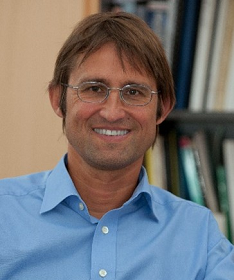
Relatore: Prof. George Kresse
Titolo: Machine learning and beyond DFT methods: quantitative materials modeling at your fingertips
Abstract. I will present two closely intertwined key developments that we have pursued in recent years: machine-learned force fields (MLFF) – with an emphasis on Δ-learning – and the development of a quantum Monte-Carlo method (auxiliary-field QMC), both closely tied to VASP. The talk will begin with an overview of density functional theory and its shortcomings, a brief introduction to the random-phase approximation and the MLFF approach implemented in VASP, and then highlight applications that rely on Δ-learning.
Δ-learning is an efficient approach to construct a machine learned force field for density functionals or correlated wavefunction methods that are expensive to evaluate. We have now used this approach for many materials, including zirconia [1], SrTiO3 [3] and CO adsorbed on Rh(111) [2], as well as liquid water. For the first three applications we have learned the difference between a semi-local functional and the random phase approximation. Typically, we find that the number of computations for the expensive method can be reduced by one to almost two orders of magnitude using Δ-learning. The final machine-learned force field has the same speed and convenience as any other force field and can be used to make finite temperature predictions or exhaustive searches of the configuration space as for any other MLFF. For water, we have learned the difference between expensive hybrid functionals and a semi-local functional. Remarkably as few as 20 hybrid functional calculations are sufficient to determine an MLFF that has comparable accuracy to conventional DFT-based MLFFs. This means that the difference between different approximations can be learned with very little training data.
It also means that correlated wavefunction methods, often thought to be too expensive for routine computations, become a serious option for materials modeling. This has led us to develop and implement the auxiliary-field QMC [4], a method that is fully compatible with other quantum-chemistry methods but shows much more favorable scaling. First applications for small molecules and solids are presented [5-6].
References
1. Liu, Verdi, Karsai, and Kresse, Phys. Rev. B 105, L060102 (2022)
2. Liu, Wang, Avargues, Verdi, Singraber, Karsai, Chen, and Kresse, Phys. Rev. Lett. 130, 078001 (2023)
3. Verdi, Ranalli, Franchini, and Kresse, Phys. Rev. Materials 7, L030801 (2023)
4. Zhang, Krakauer, PRL 90, 136401 (2003)
5. Surkurma, Schlipf, Hummer, Taheridehkordi, Kresse, JCTC (2023)
6. Taheridehkordi, Surkurma, Schlipf, Hummer, Kresse, J. Chem. Phys. 159, 044109 (2023)
Dove
Auditorium Guido Martinotti, via Vizzola 5, 20126 Milano
Biografia
Georg Kresse (born 1967, Vienna) is a leading physicist in computational materials science. He earned his PhD from Vienna University of Technology in 1993 and later became a professor there in Computational Quantum Mechanics. A member of the Austrian Academy of Sciences and the International Academy of Quantum Molecular Sciences, he has received numerous awards, including the START Grant, Hellmann Prize, and Kardinal-Innitzer-Preis.
Kresse is the main developer of VASP, the world’s most widely used quantum mechanical simulation software, with related publications among the most cited in science. His current research focuses on machine learning for advanced material predictions. With 350+ publications and an h-index over 130, he is a highly influential figure in his field.
Breakthroughs in Materials Science
Il seminario rientra nell'iniziativa Breakthroughs in Materials Science, organizzata dal Dipartimento di Scienza dei Materiali dell’Università di Milano – Bicocca. Questa iniziativa propone un ciclo di interventi da parte scienziati di fama internazionale, i cui recenti studi hanno promosso e consentito una profonda evoluzione nel campo della Scienza dei Materiali, con grandi ricadute anche a livello tecnologico. Aventi carattere divulgativo, i seminari sono rivolti a docenti, studenti e ad un vasto pubblico interessato a temi scientifici e tecnologici. Oltre alla partecipazione in presenza, sarà reso disponibile il collegamento in streaming.